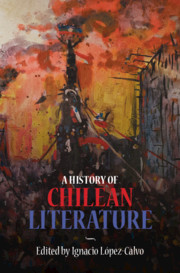Book contents
- A History of Chilean Literature
- A History of Chilean Literature
- Copyright page
- Dedication
- Contents
- Figures
- Contributors
- Acknowledgments
- Introduction
- Part I Proto-Chilean, Colonial Chronicles and Letters
- Part II Nineteenth-Century Articulations of an Embryonic National Consciousness
- Part III Beyond Chileanness: Heterogeneity and Transculturation in Canonical and Peripheral Twentieth- and Twenty-First-Century Literature
- Chapter 12 Gabriela Mistral, Chilean Women Writers, and Intersectionality
- Chapter 13 The Verse as Being in the World
- Chapter 14 Mapuche Poetry
- Chapter 15 The Translation Origins of Literary Mapuche Aesthetics
- Chapter 16 Theatrical Trends and Social Changes in Chile, 1910–2018
- Chapter 17 Jewish Voices, Chilean Literature
- Chapter 18 Chilean Arabic Writing
- Chapter 19 Asian-Chilean Writing and Film, and Chilean Orientalism
- Chapter 20 Croatian-Chilean Literature
- Chapter 21 Chilean-American Writing since September 11, 1973
- Chapter 22 LGBTQ Writing and Cultural Consciousness in Chile
- Chapter 23 Permutations of Selfhood in the Work of José Donoso
- Chapter 24 Isabel Allende, the Post-Boom, and Chilean Exile Literature
- Chapter 25 Roberto Bolaño: His Fiction of History, History of His Fiction
- Chapter 26 Alejandro Zambra and Recent Chilean Narrative
- Chapter 27 Film and Literature in Chile
- Chapter 28 Violence and Memory
- Chpater 29 Chilean Digital Literature
- Chapter 30 Detectives at the End of the World
- Index
- References
Chapter 26 - Alejandro Zambra and Recent Chilean Narrative
From the Political to Autobiografiction
from Part III - Beyond Chileanness: Heterogeneity and Transculturation in Canonical and Peripheral Twentieth- and Twenty-First-Century Literature
Published online by Cambridge University Press: 27 September 2021
- A History of Chilean Literature
- A History of Chilean Literature
- Copyright page
- Dedication
- Contents
- Figures
- Contributors
- Acknowledgments
- Introduction
- Part I Proto-Chilean, Colonial Chronicles and Letters
- Part II Nineteenth-Century Articulations of an Embryonic National Consciousness
- Part III Beyond Chileanness: Heterogeneity and Transculturation in Canonical and Peripheral Twentieth- and Twenty-First-Century Literature
- Chapter 12 Gabriela Mistral, Chilean Women Writers, and Intersectionality
- Chapter 13 The Verse as Being in the World
- Chapter 14 Mapuche Poetry
- Chapter 15 The Translation Origins of Literary Mapuche Aesthetics
- Chapter 16 Theatrical Trends and Social Changes in Chile, 1910–2018
- Chapter 17 Jewish Voices, Chilean Literature
- Chapter 18 Chilean Arabic Writing
- Chapter 19 Asian-Chilean Writing and Film, and Chilean Orientalism
- Chapter 20 Croatian-Chilean Literature
- Chapter 21 Chilean-American Writing since September 11, 1973
- Chapter 22 LGBTQ Writing and Cultural Consciousness in Chile
- Chapter 23 Permutations of Selfhood in the Work of José Donoso
- Chapter 24 Isabel Allende, the Post-Boom, and Chilean Exile Literature
- Chapter 25 Roberto Bolaño: His Fiction of History, History of His Fiction
- Chapter 26 Alejandro Zambra and Recent Chilean Narrative
- Chapter 27 Film and Literature in Chile
- Chapter 28 Violence and Memory
- Chpater 29 Chilean Digital Literature
- Chapter 30 Detectives at the End of the World
- Index
- References
Summary
It is worthwhile probing why Alejandro Zambra’s revisionist prose – with its ponderous ideas and conceptual reach, semantic reconstructions, dissemination in various media, apolitical timeliness, and relations to motley literary caretakers – is repeatedly accepted, mentioned, quoted, and cherished in worldwide interpretative communities as one of the most innovative younger writers today.
- Type
- Chapter
- Information
- A History of Chilean Literature , pp. 538 - 557Publisher: Cambridge University PressPrint publication year: 2021



